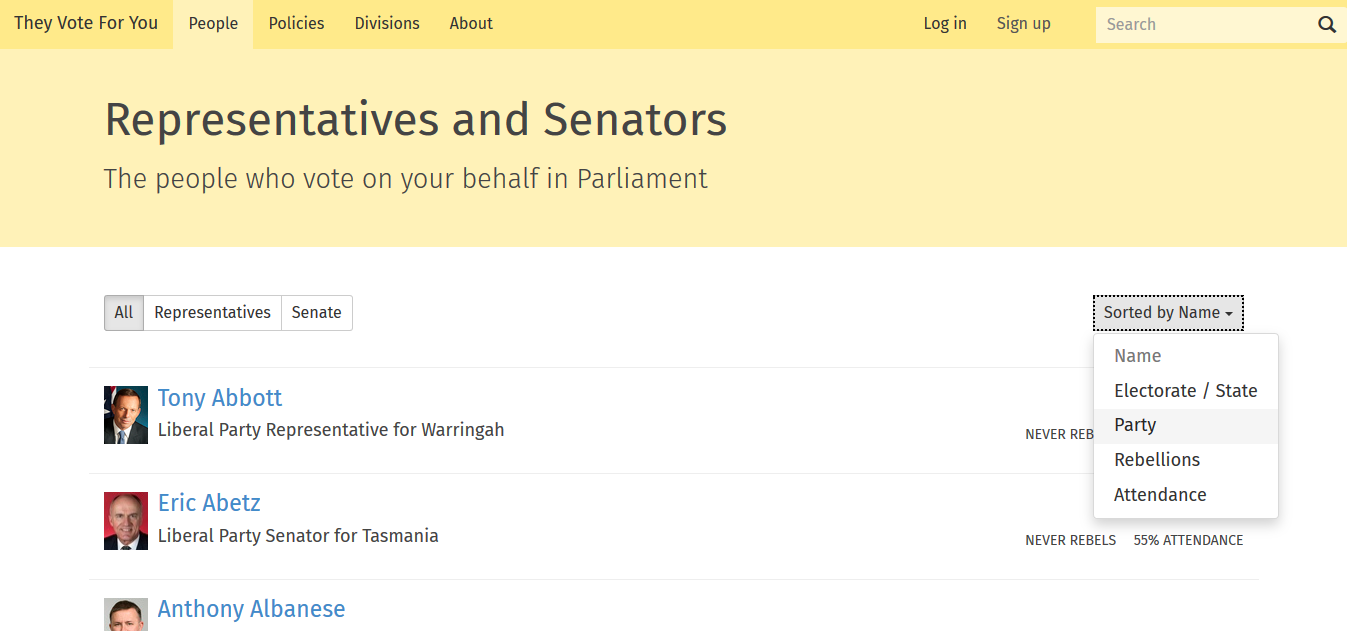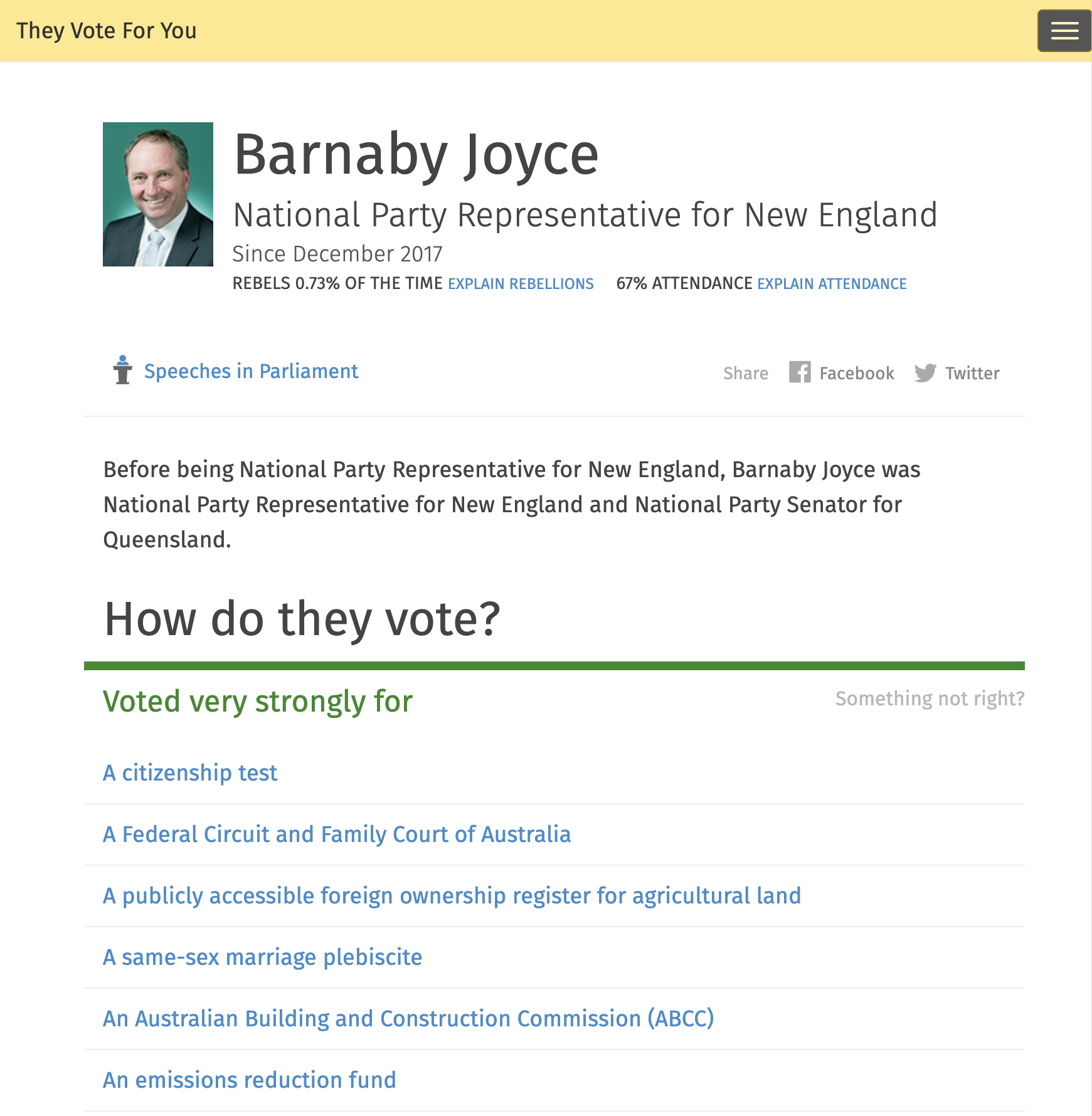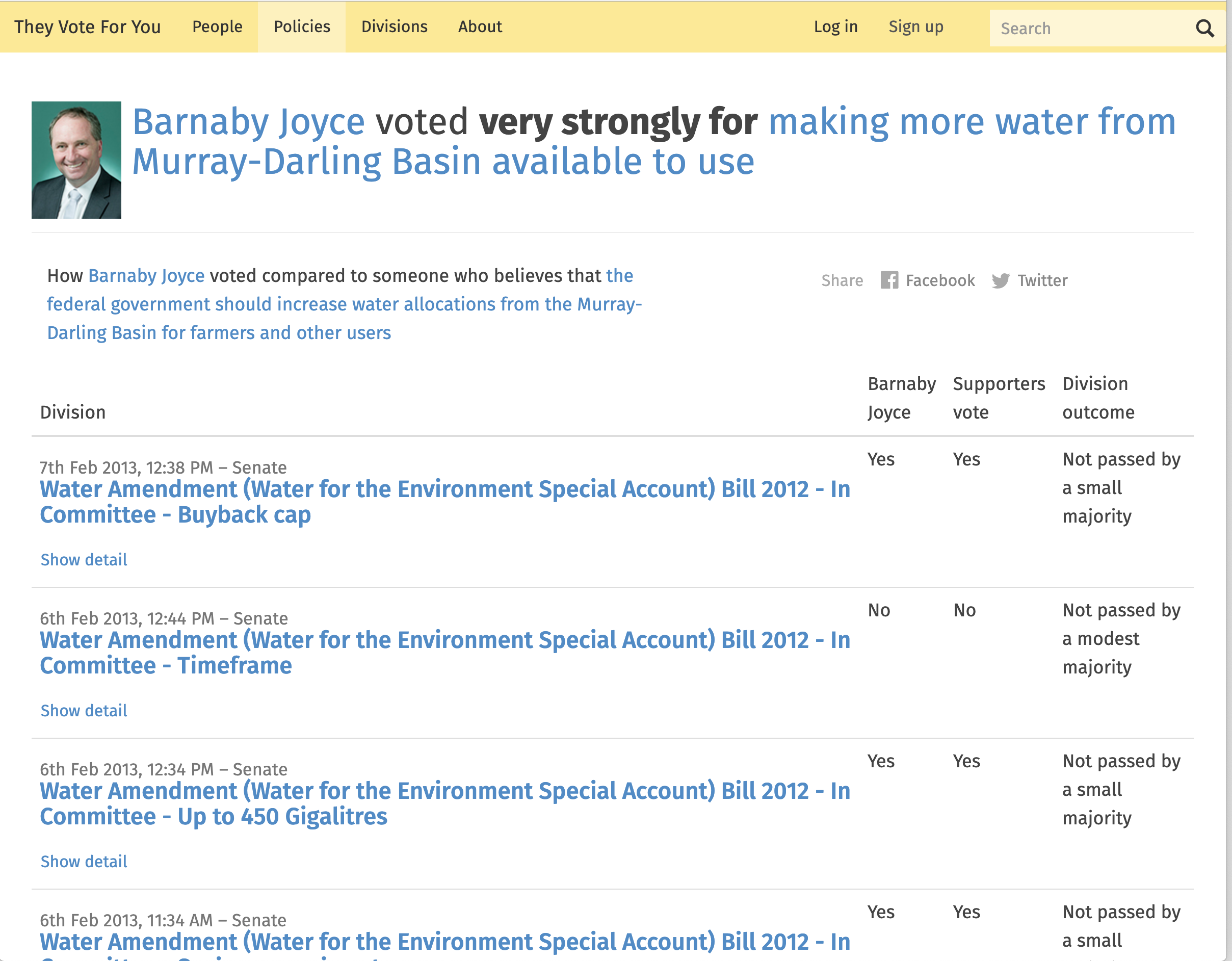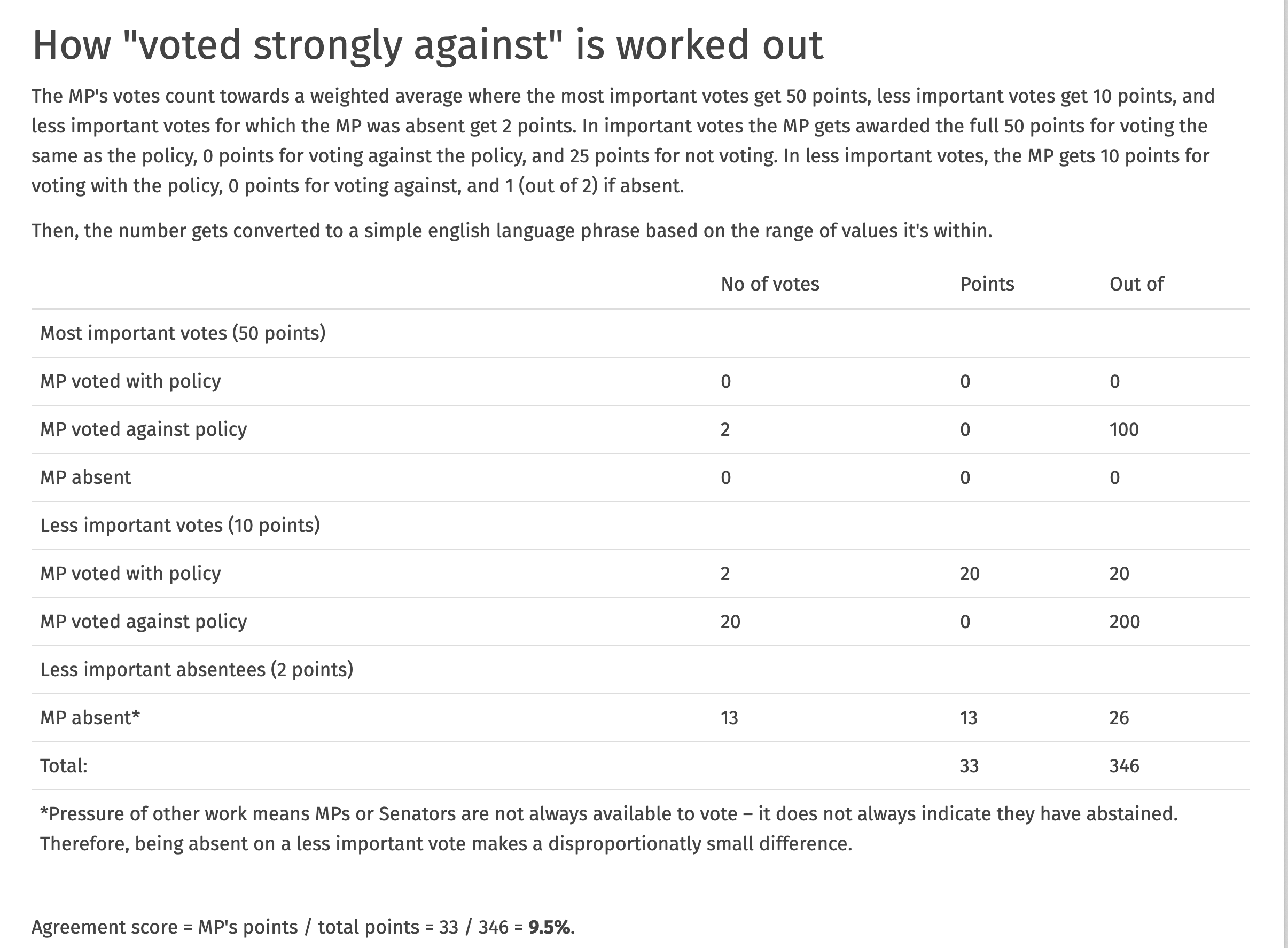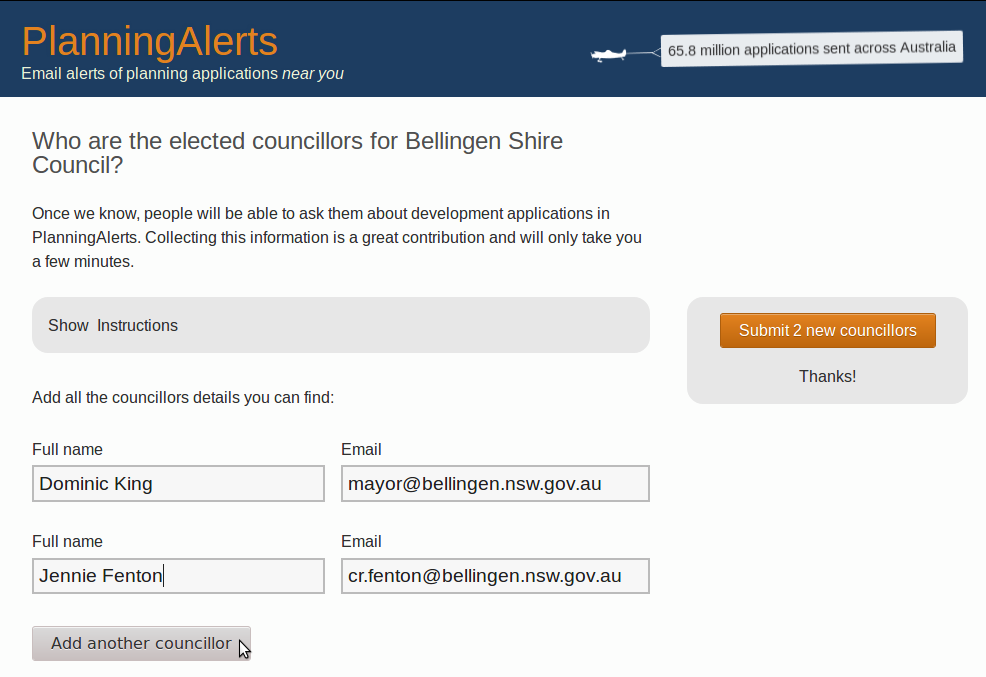On 23 August 2018 the Senate referred the Freedom of Information Legislation Amendment (Improving Access and Transparency) Bill 2018 to the Legal and Constitutional Affairs Legislation Committee for inquiry and report by 30 November 2018.
Here is OpenAustralia Foundation’s submission to the Senate in response.
Prepared by Ben Fairless, Katherine Szuminska, James Polley, Matthew Landauer
Summary
Amends the: Archives Act 1983 to require the reporting of external legal expenses incurred by the National Archives of Australia; Australian Information Commissioner Act 2010 to: ensure that the Information Commissioner holds specified qualifications; and require the separate appointment of the Australian Information Commissioner, the Privacy Commissioner and the Freedom of Information (FOI) Commissioner; and Freedom of Information Act 1982 to: enable the transfer of Information Commissioner reviewable decisions to the Administrative Appeals Tribunal (AAT); require the consistent application of exemptions by decision makers in the context of a review by the Information Commissioner; prevent the Information Commissioner from making FOI decisions if he or she does not hold specified qualifications; prevent agencies from publishing FOI information until at least 10 days after the applicant has received his or her copy of the information; and require the reporting of external legal expenses for each Information Commission or AAT FOI matter that has concluded.
Bills of the current Parliament
The OpenAustralia Foundation would like to thank the Senate Standing Committee on Legal and Constitutional Affairs for extending this opportunity to make a submission to the Committee’s inquiry into the Freedom of Information Legislation Amendment (Improving Access and Transparency) Bill 2018 (the Bill).
Over the last few years the government has acted to undermine and disempower the OAIC, reducing scrutiny of its actions and limiting access of citizens to government information. We broadly support the intentions of the amendments as they serve to reduce some of the ways in which the OAIC has been undermined.
We broadly support the intentions of these amendments, as laid out in the explanatory memorandum, and comment on a number of the amendments.
We recommend that the committee support many of the following proposed amendments
The OpenAustralia Foundation (OAF) recommends that the committee support many of the the amendments proposed in the Freedom of Information Legislation Amendment (Improving Access and Transparency) Bill 2018 (the Bill).
The OpenAustralia Foundation recommends the committee support proposed amendment 1 – the Archives Act 1983, 55B, reporting on legal expenses we support this amendment.We further encourage the committee to consider if, in 2018, it isn’t unnecessary to wait up to 12 months for the public to know how much the government spent on external lawyers to challenge Freedom of Information (FOI) requests. We therefore respectfully further suggest that this information be required to be ongoingly reported. For example, this information could be declared publicly online within 30 days, in a machine readable format, on their own website, and uploaded to a public repository such as data.gov.au. Summaries would then easily available and downloadable, for the Annual Report, as well as reuse by others who report this information independently, and for external researchers use.
Amendments to Australian Information Commissioner Act 2010 and Amendment 2 At the end of section 10, Amendment 3 Subsection 12(2)
The OpenAustralia Foundation supports qualified assessment of FOI reviews by a sufficiently resourced, fully Independent FOI Commissioner who has appropriate qualifications and who has demonstrated support of FOI as a vehicle for giving people the right to access information.
To the extent that this amendment removes a loophole under which an unqualified Privacy or Information commissioner could exercise the FOI functions, we support this amendment.
Amendment 4 At the end of section 14 Separate commissioners to be appointed
We support the intention that each Commissioner’s appointment be a separate person, so that one person is not doing the work of three people.
The OpenAustralia Foundation broadly support amendment that the office not be left open for more than 3 months is useful in the short term. It’s a defensive maneuver to ensure that the role be not effectively ceased by leaving it open.
However, we have a question about this. Is it possible to compel the executive to make an appointment? Or give the power to the Senate or the House to appoint someone if the position remains vacant for a period of time?
While this comment is beyond the scope of consideration by the committee, the OpenAustralia Foundation would like to suggest a more sustainable way to ensure the role be usefully maintained. Introduce a more robustly Independent process, where the appointment of Information Commissioners is not dependent on the support of the executive that they are there, ultimately, to hold to account.
It’s time for a full review of Freedom of Information
While OpenAustralia Foundation is recommending the committee support this amendments bill, we do so as it is the only thing we are aware of before Parliament that seeks to improve access to information.
We note the recommendations of Dr. Alan Hawke in the 2012-2013 review and the suite of recommendations that yet lie unexplored and untapped in the provision of better FOI service for everyone.
In Australia’s first Open Government Partnership National Action Plan, the Government committed to a range of reforms including Information management and access laws for the 21st century. This too remains stalled or incomplete.
Freedom of Information is essential to a secure democracy
The Government holds information gathered on behalf of the Australian people. The Government is required to make documents in the public interest freely available to the public. Governments also need to give open access to people wanting specific information.
Australia was an early adopter of securing the rights of everyone to access information, but the rest of the world is moving quickly and we’re now falling behind.
Only half a dozen countries secured the rights of everyone to access information when Australia enacted the Freedom of Information Act 1982. As of September 2013, at least 95 countries around the world now have Freedom of Information laws. These are also known as Access to Information and Right to Information laws. [1] A number of countries have enacted FOI legislation since this report, taking the number to well over 100. This access is a key component of transparency, accountability and civic participation. It’s a way for everyone to scrutinize Government and public sector information, to become better informed, and to take full part in our democratic system. FOI is increasingly strengthened as part of Open Government initiatives, in which Governments are expected to be open and promote openness.
The last time we wrote to support retaining the Office of the Information Commissioner (OAIC), Australia ranked 47th in the world, and today that ranking has further slipped to 65th in the global index of right to information standards. [2]
We can do much, much better.
RightToKnow.org.au
Freedom Of Information (FOI) is a crucial part of the checks and balances in any democracy, and key part of transparency and accountability of Government.
The process of making a freedom of information request is not very straight forward. OAF created the RightToKnow.org.au site with the aim of demystifying and simplifying this process and helping more Australians make FOI requests.
The site not only shows all requests but the paper trail of correspondence in pursuit of the request from those requesting documents and those holding them. Read more below at About RightToKnow.org.au
The site provides an unparalleled public view of the workings of the Australian Federal FOI system.
RightToKnow collects evidence
OAF facilitated 1627 requests in 2017, and 1787 so far in 2018 FOI requests and their related correspondence made to local, state and Australian Federal authorities through RightToKnow.org.au
OpenAustralia Foundation sees how many requests were unsuccessful (refused or did not turn up any documents), and just how many remain unresolved. These await reply, await classification, are overdue, or long overdue for a response. RightToKnow doesn’t provide a way to follow them through to Information Commissioner review currently.
The OAF has previously provided information relating to unsuccessful requests to earlier inquiries. We are currently compiling the latest statistics and will publish them here as soon as they are available.
Australia needs a fully functional and fully independent OAIC
For accountability, everyone need access to a free merit review system administered by an effective independent office. We already have that office, in the Office of the Australian Information Commissioner (OAIC). Underfunding the OAIC, then complaining that IC reviews take too long and using public money to hand appeals over to the Administrative Appeals Tribunal (AAT), a system that is inherently more expensive to administer each decision, and which requires legal representation on both sides, looks like a heavy handed, inefficient move at increased cost to the Australian public.
Delay release by the Agency or Minister to the public, by default
Amendment 8 Subsection 11C(6) where the agency or Minister delay public release of information released to the applicant.
In response to amendment 8, the OpenAustralia Foundation understands that FOI is applicant blind. 10 days is a fairly lengthy delay by default, however delaying release by default can also be a safer option. We’ve seen examples on RightToKnow just in the last couple of months where private information was erroneously published; therefore it makes more sense to default to a delayed release to give both sides a chance to review what’s about to be released.
We note that this would be possible to implement across the board in RightToKnow, and is a provision we have been actively considering.
We note the importance that this provision only binds the agency or Minister; it doesn’t prevent the applicant from making the information they received public immediately.
*Time limit for publication
(6) The agency or Minister must comply with this section within 10 working days after the day the person is given access to the document.”
Further to this provision, there is an opportunity to clarify that documents should be published at this time. Currently what’s required to be published in disclosure logs is a way to access the documents, and not necessarily the documents themselves. This is interpreted by some to not publish the documents online.
Keep Freedom Of Information Free for Everyone
Amendments 9 Subsection 29(1)(d) and 10 After subsection 29(5) suggests granting an exemption of fees if the application processing costs are under $1,000.
The OpenAustralia Foundation opposes amendments giving different rights of access to Members of the House of Representatives and Senators. We believe that the existing 5(b) public interest test would be sufficient here – that is, if the cost is low and a Senator or Member is requesting the information, we believe that it’s likely to be in the public interest that charges are waived..
We believe that making exemptions for politicians makes it more difficult for politicians to notice problems with the legislation that affect everybody else using it.
If this amendment has been suggested because of an understanding that Parliament is currently paying too much in order to have FOI applications approved, we believe this indicates that costs are too high for everybody and would prefer to see them dropped overall rather than an exemption being made for Senators and Members.
Fund the OAIC, and let it serve the Australian Community. Keep Appeals Timely and Free, for Everyone
Amendment 12: At the end of Division 6 of Part VI, 55JA Procedure in IC review—notice requirement if lengthy review and 55JB Procedure in IC review—transfer to Tribunal
To give ordinary users of FOI access recourse when their requests are denied, refused or avoided, then FOI law gives the a right of appeal to an independent office. An external review system which is accessible, free, and appropriately resourced to enable independent and timely assessment of whether the everyone’s rights of access were upheld is essential.
The OpenAustralia Foundation does not support amendment 12 as it stands, it’s a long time to wait for a review. The applicant has probably gone through a 30 day initial, 30 day internal review, maybe some consultation, even where the authority is straightforward in their dealings. It’s possible for the request to be outstanding for 60+ days when the matter gets to the Information Commissioner (IC) – The IC should be sufficiently funded to be able to make decisions in the normal course of events within 30 days, and allow them to be referred to the AAT.
We do however, fully support waiving the costs associated with referral to the Administrative Appeals Tribunal.
Having been significantly hampered in its operations since the Government attempted to abolish the OAIC, agencies continue to routine refusing requests knowing this will go on unchecked for significant periods of time, and as a result, far fewer cases have be investigated. If fewer people trust the FOI system, fewer requests will be made. Determinations will lead straight to a more costly review process needing expensive legal assistance. That would be a terrible outcome for FOI and for Australia’s democratic health.
There are those who do wish to go straight to the Administrative Appeals Tribunal (AAT), including media reporters following a time critical story. While this bill provides options to allow people to refer a matter to the AAT without waiting a minimum of 6 months, we are concerned that this provides an incentive to not increase the funding of the OAIC to provide an acceptable service to the Australian community, but rather divert funds to a body that necessarily formalises the appeals process.
Framing FOI as a legal problem, not a civic right is plain wrong. FOI decision makers and officers use the language of legal exemptions in interpreting the Act, rather than emphasise the need for openness and of ‘maximum disclosure’ made more explicit in 2010 reforms to the FOI Act.[4] Having learned all the standard tricks of the refusal trade, agencies have become very adept at refusing FOI requests as a matter of course.
Everyone Has a Right To Information
Switching from one argument to refuse a request to another can be a lack of clarity in the initial assessment, a defensive move, a delay tactic, or a blindness to everyone’s rights to know.
As we have noted before, we’ve had an opportunity running RightToKnow, to see how agencies behave. Publicly available FOI requests and their correspondence have given us all an opportunity to see first hand how agencies handle requests.
The evidence we present shows that there are big differences across agencies’ handling of FOI requests. Some agencies handle requests professionally and courteously. Thank you to those agencies.
Some agencies show a systemic culture of secrecy and a disrespect for FOI requests at work; they’re the ones gaming the system.
A systemic culture of secrecy
We support amendment 11.
Australia has unbalanced laws about releasing information. The Government already appears acutely aware of the risks associated with releasing information but much less aware of the risks of not releasing enough information. We have a system which severely punishes those public servants who release information which in it’s view ought not be public, and consciously or not, systematically encourages and protects those who avoid publishing information they could easily share. Thus it becomes safer for every public servant to hold documents close, and release as little as possible by default. This all helps to create the culture of secrecy.
We’re not surprised when we see agencies interpret FOI law to the most minute detail with the purpose of releasing information to the public by default. They argue against the release of even mundane documents where the material is uncontentious or even publicly available in another form already. At the same time, obstructive agencies also display what might be wilful misinterpretation or incompetence in their failure or inability to give the documents requested.
Such responses show that there is a culture of working harder to refuse rather than share their documents, Whether due to failing inefficient old information storage and retrieval systems, fear or lack of leadership, they’re acting in flat contradiction to their responsibilities under the Freedom of Information Act 1982(FOI Act).
Some are knowingly gaming the system, and we have observed that switching reasons for refusal can fall into that pattern of delaying tactics. For this reason, we support amendment 11.
Amendment 11 Procedure in IC review—consistent application of exemptions by decision-maker that includes relying on any exemptions in Divisions 2 and 3 of Part IV that were not relied upon in making the IC reviewable decision.
About RightToKnow.org.au
Right To Know aims to make it easier for everyone to make Freedom of Information requests in a few different ways.
- Helping you make your successful request is the main focus of the site
- Bringing all the authorities together saves time, you don’t have to trawl the web for the right authority first
- To make the process easier to understand, it uses plain english
- To get a feeling for the scope, wording of successful requests, it offers you dynamic search for related requests so you can see how others have done it
- Clearly communicates your rights of access
- Guidance appears as and when you need it to keep the request flowing through Right to Know and the Public Authority to whom your request is being made
RightToKnow does not provide help for individuals accessing private or personal information held by government.
About OpenAustralia Foundation
The OpenAustralia Foundation encourages and enables people to participate directly in the political process on a local, community and national level. We believe that we can help to reinvigorate Australia’s civic culture by using powerful and exciting new technologies to inform and empower people, to address the growing disconnect between the Government and the people who elect it.
We currently do this through our five online projects TheyVoteForYou.org.au RightToKnow.org.au, OpenAustralia.org, PlanningAlerts.org.au and previously ElectionLeaflets.org.au. Additionally we provide infrastructure with morph.io These services aim at finding better ways of making government, the public sector and political information freely and easily available and usable by all Australians. We aim to inform people so they can make a positive difference.
The OpenAustralia Foundation is a strictly non-partisan organisation. We are not affiliated with any political party. We are simply passionate about making our democracy work.
Notes and References
*Not included here or at RightToKnow.org.au are requests which were hidden from the website because they contained inappropriately personal requests for information (not what the site is for). This is made clear on the site’s help page.
[1] Right to Information Index: http://right2info.org/access-to-information-laws
[2] https://www.rti-rating.org/country-data/
